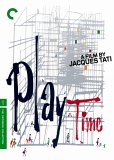| Reviews & Columns |
|
Reviews DVD TV on DVD Blu-ray 4K UHD International DVDs In Theaters Reviews by Studio Video Games Features Collector Series DVDs Easter Egg Database Interviews DVD Talk Radio Feature Articles Columns Anime Talk DVD Savant Horror DVDs The M.O.D. Squad Art House HD Talk Silent DVD
|
DVD Talk Forum |
|
|
| Resources |
|
DVD Price Search Customer Service #'s RCE Info Links |
|
Columns
|
|
|
Playtime - Criterion Collection
THE MOVIE:
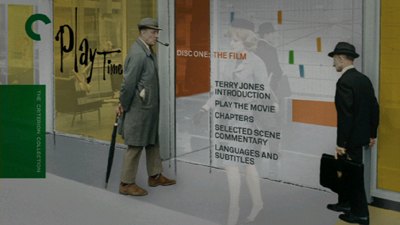
Jacques Tati's 1967 masterpiece, Playtime, is one of those special films that entertains as it enlightens. On its surface, it is a comedy constructed in the fashion of classic silent films by the likes of Chaplin, Lloyd, and Keaton, where hapless characters bumble through increasingly complex scenarios that befuddle them while amusing the audience. Like his talented forebears, however, Tati uses his comedies to uncover larger truths about human nature and society. In Tati's case, he is particularly interested in how the common individual deals with an increasingly perplexing technological world. His recurring character, whom he portrays himself, is the pipe-smoking Monsieur Hulot, the every-man stand-in. Hulot is genial, but hapless, always stepping into the wrong mess while wearing the wrong pair of shoes, but somehow coming out of the other side with his laces tied and a fresh new shine.
The Criterion Collection originally released Playtime in 2001, but it went out of print a little over a year later. Since then, fans have been waiting patiently for the much anticipated re-issue. The rumor mill promised a restored version of the film, spruced up to match new standards of technology--a process I am sure would cause Monsieur Hulot to scratch his head in confusion. Thankfully, the folks at Criterion suffer from no such confusion, and they've put together an all-new two-disc package that is cause for great rejoicing among film fans.
Playtime is an intimidating film to write about. Completely free of a conventional plot, Playtime chronicles twenty-four hours in Paris. From the airport to the city center and back again, we follow a gaggle of American tourists (all women) on their vacation. They, of course, cross paths with Hulot, and their misadventures expose the ludicrously complicated excess of modern innovation. Filmed with very little dialogue, the story of Playtime was more like an unreal vision of what could have been the Paris of tomorrow than it was a contemporary take on the city; yet, by showing where people were heading, Tati was able to say some things about where they already were. Given technology's still increasing hold on our lives, his wry observations are possibly more apropos in 2006 than 1967.
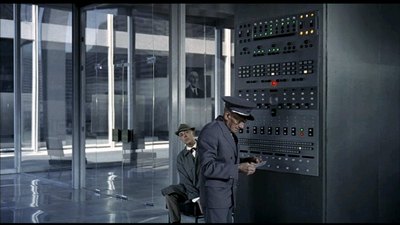
In Tati's world, machines are confounding; yet, they are ever-present. Aged gentlemen stand before huge banks of buttons, punching in an increasingly complex code to achieve rather small results. Tati has seen how this technology has opened up the world by granting more possibilities to all, and to reflect that, he has constructed office buildings with walls made entirely of glass and corridors that appear to go on forever. He knows it's a double-edged sword, however: while the glass opens things up, it also pushes us farther apart. Hulot stands in a glass room, completely visible from the outside, but impossible to hear. So, he may be seen, but he can't communicate, and opportunities pass by in full view. More potent is the later image of an apartment building where the outer walls are all really windows. People go on with their lives, acting out their private dramas in plain sight--except they take no notice of people on the street, and the people on the street take no notice of them.
In the same sequence, Tati has fun skewering entertainment, as well. The side-by-side apartments all have their television sets located in the same spots on their adjoining walls. At one point, we see two families both watching their sets as if they were staring at each other, and at another, drama plays out on one side of the wall while the neighbors appear to be sitting and watching. As the scene fades, a man undresses as if doing a striptease for the woman next door. We have become each other's entertainment! Surely Tati wasn't looking into the future and predicting reality TV?
Of course, as I've said, living in Tati's world isn't all bad. Modernity is not entirely subsumed by alienation. In its way, it has made the world a much smaller place, as represented by the variety of international visitors coming to Paris. The film, even with its absence of constant dialogue, is more multilingual than it is French. Many scenes are in English, and I heard other languages come through as well. All the tourists who have come to France are connected, acting in tandem. They may separate at one corner, but they are reunited at another. The growth of one common experience can be seen in the symbolism of one of the more playful visual gags running through Playtime. Tati has unleashed an army of Hulots on Paris. Other characters run up to men of every race, age, and size who are wearing Hulot's regular raincoat and hat, mistaking these impostors for Hulot even as the real Hulot passes by undetected in the background. Not even our bumblers are that unique anymore.
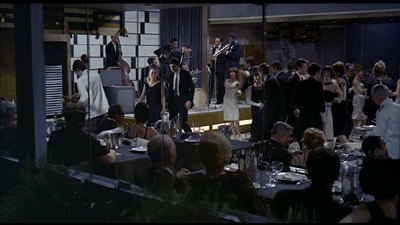
When night sets, all the various tourist groups and the locals come together for one big party. It's here that Tati creates his best microcosm of modern living. The party is at a restaurant on its first night. The final touches of the construction are still being hammered out when the first diners step through the door. As the revelry carries on towards dawn, the new restaurant falls apart, turning into one giant mess. Yet, the party rages on. Regardless of how much our creations fail us, humans don't buckle under, we endure. Love can even be found here, as seen in the ungainly courtship of the young American (Barbara Dennek) by Hulot.
And so it will always be. Surely this is what Tati intends us to take away from the final shots, wherein the American ladies load back into their bus to catch their flight home? Locking them in Parisian traffic, Tati then pulls his camera back to show that everyone is traveling in a circle. Life continues to go around, same as it ever was. Heck, the visitors didn't even go very far into the city, their various activities really happening on the same city blocks. Famous sites like the Eiffel Tower are only spotted as reflections in windows somewhere behind the traveler. It could be seen as cynical, no one really has their own experiences anymore, they just view the experience, but I think Tati had something more uplifting in mind. If he didn't, could Playtime be so absent of despair?
The final image that sticks with the audience as Playtime nears its end is when the courted American woman finds a small brooch shaped like a flower at the bottom of the gift box Hulot gave her. As her bus carries on towards the airport, we see that the streetlights that have grown up around it echo the shape of her flowers. The beauty of nature may have been replaced by man-made beauty, but isn't it still beautiful?
All of this high minded theorizing on my part does a disservice in that it skips over the best aspect of Playtime: it's full of great laughs. Jacques Tati has made a comedy, after all, one that is about playing around, and despite its elaborate design, he never forgets there should be a punchline at the end of each and every one of Hulot's travails. The length of time and cost of making Playtime is legendary, but every second and every cent ends up in the picture. Its hypnotizing progression only remains hypnotizing because it's so damned entertaining. Tati may have had some things he wanted to tell us about the way the world works, but he remembered Mary Poppins' maxim that a spoonful of sugar makes the medicine go down. Playtime inspires enough laughter and awe that the grander meaning almost feels like an accidental byproduct. The smiles it puts on our faces is why Playtime is the kind of time we want to indulge in again and again.
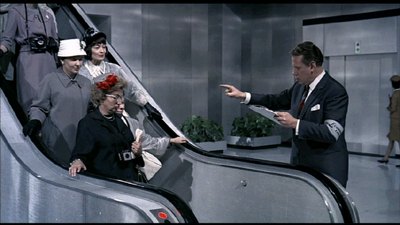
THE DVD
Video:
I was so excited to check out the Playtime reissue, I went to the house of a friend who had a bigger TV and a better sound system than my own. Boy, did it pay off!
The new DVD of Playtime was made from a newly restored high-definition transfer. It's shown in a 1.85:1 aspect ration. The picture is flawless, full of wonderful colors and showing every meticulous inch of detail Tati put into the movie. A quick comparison makes the difference obvious. If you have both discs, pop them in and watch the opening scenes in the airport. The color of the first Criterion is washed out, and the gorgeous blues we see now were dull grays.The same in the images below. The sickly greens are more vivid, and note how some of the background was bleached in the first go-around.
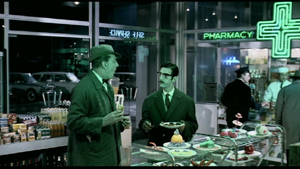
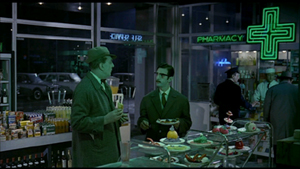
2001 Edition vs. 2006 Edition
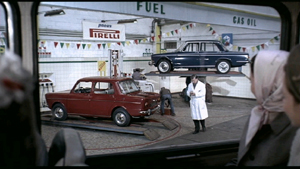
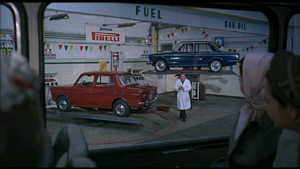
2001 Edition vs. 2006 Edition
It should be noted that the running time on the back of the new packaging is listed as 124 minutes, while the old DVD was 120. While there was a different cut with more sequences that extend the running time up to 155 minutes, from what I can tell, this is not that (if, indeed, it could ever be found). At the beginning of the film, there is now a rather long credits sequence listing those involved with Playtime's restoration, and I believe that accounts for the increased running time.
Update: A couple of people have e-mailed with helpful info regarding the cut. This new DVD is indeed longer, by about six minutes. The main additions are extra bits with the multiple Monsieur Hulots. Thanks everyone for helping clear that up! You gotta love the internet.
Sound:
Criterion offers two stereo tracks, one in the original French language and the other billed as an "alternate international soundtrack." Given how little dialogue there is, and how much of it is already in English, a dub seems superfluous, but it was actually created by Tati and I guess since it was out there, it didn't hurt to include. More important than dialogue in Playtime are the sounds of the city. Tati has several sequences where he uses traffic noise to create an almost maddening effect, showing the pervasiveness of machines and movement. In one, a door is opened and closed repeatedly. Each time it is open, a flood of automobile racket streams in; each time it is closed, silence. While we observe the activities of the apartment building with the glass walls, we do so from outside, and the sounds of the street provide the sole soundtrack. There are a variety of cars going by at any one time, moving onscreen and off, and thus traveling across the speakers, as well. All the various vehicles, as well as pedestrian traffic, can be differentiated from one another. It sounds superb.
Ditto for scenes where Tati uses sound effects as a comedic device. There is a recurring joke about a new-fangled type of chair where the cushion always bounces back after you stand up. Tati has a blast having Hulot repeatedly test them out, and each pop of the cushioning pops right out of the stereo.
In addition to the sound, Criterion has redone the translation and subtitles. They are well-paced and easy to read.
Extras:
On its single-disc release, Criterion included two bonus features: an enthusiastic video introduction by Monty Python-member Terry Jones and a 1967 Jacques Tati short called Cours du soir. Both remain on the new edition, appearing on disc 1 and disc 2, respectively.
Disc 1 also has a selected scene commentary by film historian Philip Kemp. It covers eight segments and runs about 46 minutes. When you select it, the DVD is self-editing, moving from commentary scene to commentary scene, cutting out the in-between. Kemp sifts through Tati's own words to uncover some of the design behind Playtime, such as how all the people move in straight lines and turn at right angles in the beginning of the film. Closer to the end, they start moving in curves again. This was done to show them breaking out of the imposed motion of a mechanized world. There is freedom in curves, and bringing them back has the same effect as breaking through the glass door or tearing down the walls at the nightclub. The commentary is a tad scholarly, but given that Playtime is as much a blueprint as a movie, it invites the deconstruction.
Kemp also spends a lot of time on the excess of Playtime's shooting schedule, using the on-set anecdotes of people who were there and critical reactions to the finished product to shed some light on what Tati has wrought.
Disc 2 is entirely made of extras. They are as follows:
* Au-delà de "Playtime": A short film written by Stéphane Goudet, a well-known expert on Tati. It uses archival footage and Tati's own words to explain some of the motivation behind making Playtime. The material showing the building of the massive set that would substitute for Paris is astounding to see. It's capped by the forced destruction of the same set, nicknamed Tativille, and the poignant metaphor of the director tossing his own script under the crumbling walls. (6 ½ minutes)
* Tati Story: A well-executed biography covering the life of Jacques Tati from birth to death. It includes many live performances from his stage act. (20 minutes)
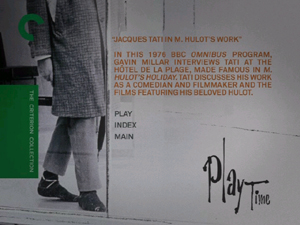
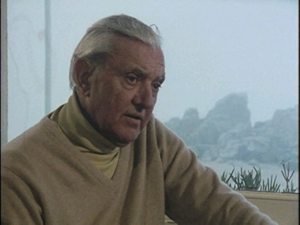
* "Jacques Tati in Monsieur Hulot's Work": This is a 1976 episode of the BBC program Omnibus. Tati's interview is filmed at the same hotel where he shot M. Hulot's Holiday. It's an extensive conversation with a particular focus on theories about comedy and heavily illustrated with clips from Tati's films. (49 minutes)
* Audio Interview: Conducted with Tati in 1972 when Playtime debuted in the U.S. at the San Francisco International Film Festival. Tati is pleasant and funny, discussing being made to cut his movies, filming in 70 mm, and his relationship with Monsieur Hulot. (17 minutes)
* Video Interview with script supervisor Sylvette Baudrot: Baudrot worked with Tati on Playtime and two other films. This interview with her is absolutely fascinating. She discusses the lengths Tati would go to, often employing rather unusual techniques, to achieve what he wanted. There are also shots of production stills and test pictures. (12 minutes)
The final extra is the package itself. Decorated in the new Criterion Collection trade dress, the discs are housed in a nicely printed fold-out case that slides into a sturdy slip-cover. It's a gorgeous design. The usual Criterion booklet is also included, and it has a new essay by Chicago film critic Jonathan Rosenbaum (thus replacing the essay by Film Comment's Kent Jones from the old insert). I must say, I really like the paper that the insert is printed on for Playtime. It's not as glossy as the standard Criterion booklets, and so less prone to fingerprints. It just seems classier.
FINAL THOUGHTS:
DVDTalk Collector Series. The new two-disc version of Jacques Tati's Playtime is one of the finest DVD packages I have ever come across. From a vibrant restoration of the innovative film to a pile of bonus features that aid the viewer in going deeper into the material, it's everything DVDs could possibly be. Since Playtime is an absolute treasure of cinema, there is also no better film to receive such treatment. Every DVD fan owes it to him or herself to have this sitting on their shelves. A perfect score!
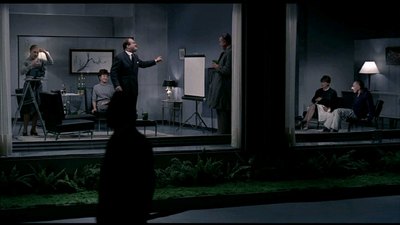
Jamie S. Rich is a novelist and comic book writer. He is best known for his collaborations with Joelle Jones, including the hardboiled crime comic book You Have Killed Me, the challenging romance 12 Reasons Why I Love Her, and the 2007 prose novel Have You Seen the Horizon Lately?, for which Jones did the cover. All three were published by Oni Press. His most recent projects include the futuristic romance A Boy and a Girl with Natalie Nourigat; Archer Coe and the Thousand Natural Shocks, a loopy crime tale drawn by Dan Christensen; and the horror miniseries Madame Frankenstein, a collaboration with Megan Levens. Follow Rich's blog at Confessions123.com.
|
| Popular Reviews |
| Sponsored Links |
|
|
| Sponsored Links |
|
|
| Release List | Reviews | Shop | Newsletter | Forum | DVD Giveaways | Blu-Ray | Advertise |
|
Copyright 2024 DVDTalk.com All Rights Reserved. Legal Info, Privacy Policy, Terms of Use,
Manage Preferences,
Your Privacy Choices | |||||||









